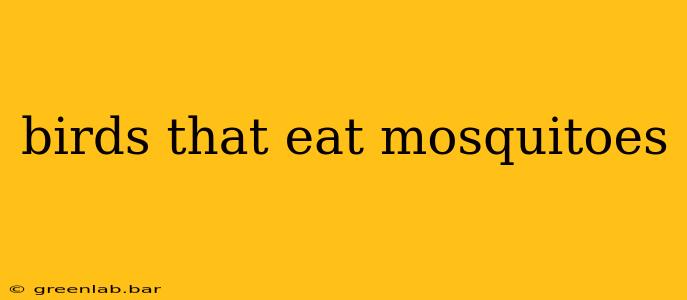Mosquitoes are a nuisance to humans, but they're also a vital food source for many birds. Understanding which birds are effective mosquito predators can help us appreciate the role of biodiversity in natural pest control and even inform our landscaping choices to attract these helpful avian allies. This article explores various bird species that enjoy a mosquito-rich diet, providing insights into their feeding habits and how you can encourage them to visit your yard.
Types of Birds That Feast on Mosquitoes
While no bird solely subsists on mosquitoes, many species incorporate them into their diet, particularly during mosquito breeding seasons. Here are some key examples:
1. Purple Martins: The Mosquito-Eating Champions
Purple martins are often cited as the most effective mosquito-eating birds. These large swallows are aerial insectivores, meaning they catch their prey on the wing. Their wide gape and exceptional flying skills allow them to snatch large quantities of mosquitoes and other flying insects in mid-air. They are highly dependent on open areas for foraging, making them less common in heavily wooded regions.
2. Barn Swallows: Agile Aerial Acrobats
Similar to purple martins, barn swallows are highly skilled aerial insectivores. They are easily recognizable by their long, forked tails and acrobatic flight patterns. While their diet is diverse, encompassing various insects, mosquitoes make up a significant portion, especially during peak mosquito activity.
3. Tree Swallows: A Versatile Diet
Tree swallows are slightly smaller than barn swallows but share their preference for aerial insect hunting. They are highly adaptable and inhabit a wider range of habitats, including forests and open fields. Their diet consists primarily of insects, with mosquitoes contributing a noticeable percentage.
4. Flycatchers: Masters of Perching and Pouncing
Various species of flycatchers, such as the Eastern Phoebe and the Great Crested Flycatcher, are adept at catching insects in the air from a perched position. They will snap up mosquitoes that fly within striking distance, making them valuable additions to any backyard ecosystem.
5. Nightjars and Nighthawks: Nocturnal Hunters
These nocturnal birds are masters of camouflage and specialize in catching insects at dusk and dawn, when many mosquito species are most active. Their wide gape and excellent night vision allow them to effectively hunt mosquitoes in low-light conditions.
Attracting Mosquito-Eating Birds to Your Yard
Encouraging these helpful birds to your property is a natural and effective way to reduce mosquito populations. Here are a few tips:
1. Provide Suitable Nesting Sites:
Install birdhouses specifically designed for the species you wish to attract. Purple martins, for example, require large, multi-compartment gourds or houses.
2. Offer a Water Source:
Birds need a clean water source for drinking and bathing. A birdbath or shallow dish of water will attract them to your yard.
3. Plant Native Vegetation:
Native plants provide shelter and insects, including mosquitoes, which serve as food for birds. Avoid using insecticides, as these can harm beneficial insects and the birds that feed on them.
4. Reduce Mosquito Breeding Grounds:
Eliminate standing water around your property to minimize mosquito breeding. This will reduce the overall mosquito population and make your yard more attractive to birds.
Conclusion: A Natural Approach to Mosquito Control
By understanding the role of birds in mosquito control and taking steps to attract them to your property, you can contribute to a healthier ecosystem while simultaneously reducing the nuisance of mosquitoes. Remember, a diverse and thriving bird population is a testament to a balanced and healthy environment. Attracting these feathered friends is a rewarding way to appreciate the beauty of nature and its subtle, yet effective, pest control mechanisms.

